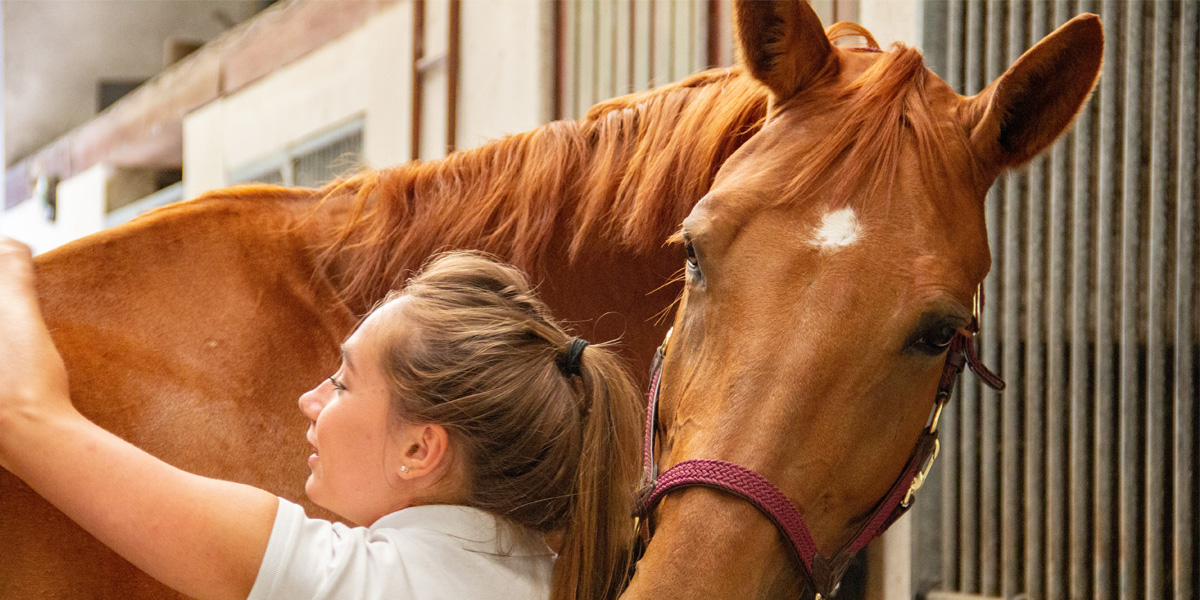How Does Fostering A Horse Work?
Doctor of Veterinary Medicine

While efforts are made to answer all questions as quickly as possible, if an immediate answer is required or if your pet is in need of urgent or emergency care, contact your pet's veterinarian immediately.
Doctor of Veterinary Medicine

You will receive an answer from Dr. Lindsay and our vet/tech team as soon as possible, usually the same day.
All answers are provided for informational or educational purposes only, and are intended to be a supplement to, and not a substitute for, the expertise and professional judgment of your pet's veterinarian.
It may be necessary to consult your pet's veterinarian regarding the applicability of any opinions or recommendations with respect to your pet's symptoms or medical condition.
CloseDoctor of Veterinary Medicine

An error has occurred, please reload the page and try again.
CloseWhile efforts are made to answer all questions as quickly as possible, if an immediate answer is required or if your pet is in need of urgent or emergency care, contact your pet's veterinarian immediately.
There is no answer related to your question

Did you know that there are an estimated 120,000 unwanted horses each year in the United States alone? Equine rescues have limited space to house horses in need. To commemorate ASPCA’s Help a Horse day on April 26th, why not learn how fostering a horse works and find out how you can make a difference for the right horse.
How Does Fostering A Horse Work?
Abandoned, unwanted, and at-risk horses end up at rescues for many reasons. They may have medical issues that their original owner did not have the time or money to handle. Or, they may have behavioral issues that their owner could not manage. Sometimes, horses lose their homes when their owners have a change in circumstances, perhaps due to a loss of their home or income.
Equine rescues often rely on a network of foster homes to provide shelter for horses in their care. While they may not have room for every horse, they can cover a majority of the expenses for each horse. If you decide to foster, the horse’s medical care and farrier costs will usually be covered by the rescue. You may still need to cover the costs of food, and of course any housing costs, property repairs, and other expenses, but they may be tax-deductible.
Most rescues can offer a fostering opportunity that matches your resources and skills. If you’re an experienced horse trainer, you may consider taking on a foster with behavioral challenges. But if you’re less experienced, the rescue can match you with a horse that’s easier to handle. Some foster horses can be ridden, others may have medical issues that make them better suited as a pasture pet or even a companion to a horse that you own.
A foster stay in your barn may last a few months until the horse is adopted into their permanent home. A horse that needs medical or training rehabilitation might require a longer commitment. A pregnant mare may need a safe place to have her foal. Or, if you’re willing, you could give a retired senior horse a place to stay while they live out the rest of their golden years.
How To Foster A Horse
While each rescue will have its own set of requirements, you can expect to prove that you meet a few basic standards.
First, you’ll need to have a barn or run-in shed on your property. A barn with stalls is ideal because you may need to isolate the foster horse for an initial quarantine or to accommodate medical or behavioral issues.
Next, you’ll need to have the budget to care for an additional horse. While you will typically not need to worry about medical and farrier costs, you may need to prove that you can pay for food, and you will need to cover any additional upkeep around your property.
These days, most horse rescues have an online application that you can submit to get the process started. You can expect to set up a home visit with the rescue, and they may require proof of income, vaccine records of other animals in your care, and other documentation.
Is Fostering A Horse Right For You?
When you provide shelter for a horse in need, you’ll not only potentially save their life, but free up their spot at the rescue for another horse. Fostering can be a great way to learn and grow, build up skills and experience, or even just enjoy the companionship of a new horse without the costs and commitment of ownership.
It will be bittersweet when your foster moves on to their forever home. It can be heartbreaking when a rehabilitative foster fails to make progress or succumbs to medical issues. And if you ever take in a foster from an abuse or neglect case, it can be downright gut-wrenching.
If fostering isn’t right for you at this time, you can always volunteer, donate, and raise awareness for your local horse rescue.
But if you love horses, have the resources, and want to make a difference, you won’t regret becoming a foster caregiver for a horse in need.
 Swipe
Swipe

















